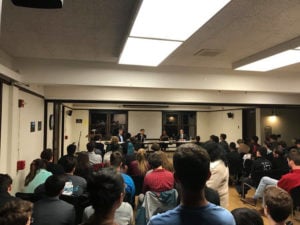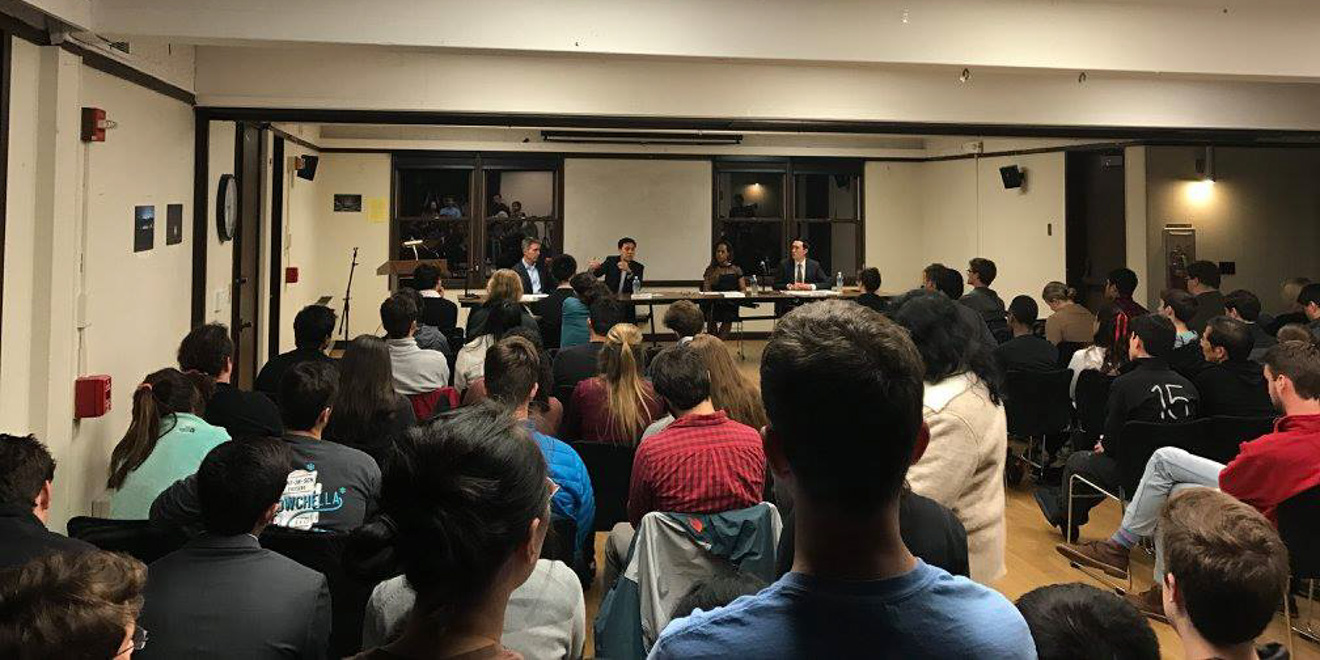A new student group called the Stanford Political Union (SPU) debuted this spring with the goal of fostering critical debate between students and experts holding different political views. The leaders of SPU aim to create an outlet where every voice can be heard.
“All debaters, students and professors are sitting at the same table on equal footing to debate these national issues,” said Steven Jiang ‘19, co-chair of SPU.
The creators of SPU say the last presidential election emphasized the need for open dialogue on campus.
“We have seen many of these discussions devolve into partisan echo chambers often lacking critical thinking on the actual policies,” Jiang said. “That is what really concerned us.”

SPU’s first event last month centered on whether to repeal the Affordable Care Act (ACA), commonly known as Obamacare. Lanhee Chen, research fellow at the Hoover Institution, joined Wayne and Jodi Cooperman Professor Mark Duggan at the Bechtel International Center to discuss the ACA. Both Chen and Duggan have significant political experience: Chen served as senior advisor for Marco Rubio’s 2016 campaign and Mitt Romney’s 2012 presidential bid, while Duggan was former President Barack Obama’s senior economist for healthcare policy.
Students Justin Hsuan ’18 and Schyler Cole ’17 also participated in the debate with the two experts. Following the debate, the four took questions from the audience.
“I appreciated that format where the people in the audience could see the base-level arguments from me and Schyler and then the slightly less accessible but academic and data-driven arguments that the experts put forward,” Hsuan said. “To have both kinds of arguments up there for people to hear and evaluate for themselves was very useful.”
Cole added that although she initially questioned her role in a debate with experts, she now acknowledges the value in her student perspective on the topic of healthcare.
“In particular, I was able to speak about women and minority and low-income concerns because that is something that I was able to witness growing up,” Cole noted.
The leaders of SPU were shocked by the number of students and outside visitors that filled the seats at the event.
“I was happy and surprised to see how enthusiastic the audience was to press the student speakers and experts with nuanced questions about the policies,” said Zoe Himwich ’19, co-chair of SPU.
Hsuan appreciated the opportunity for a student to debate two policy professors on stage.
“To be able to say that I was able to hold my own up there for an hour and a half in a policy debate with two of the most knowledgeable professors on campus is something that I’m going to remember for a long time,” Hsuan said.
The coordinators of SPU events aim to make audience questions a significant basis for the expert discussion in their next event on May 23, titled “The Economic Impact of Artificial Intelligence.”
“We are hoping that this [event] will be relevant to a lot of people as Stanford students continue to develop and use new technologies that have the capacity to replace workers,” Himwich said. “We hope to hear debate over what the moral and socio-economic effects of that change would be.”
Jiang remarked that for future events, the leaders of SPU aim to present experts from a variety of backgrounds, such as computer science professors and off-campus professionals — for example, venture capitalists and executives in the Bay Area.
“Another topic that we have considered presenting in the future is the debate over sanctuary campuses,” Himwich said, referencing an unsuccessful movement to officially dub the University a safe-haven for undocumented immigrants. “There would be a lot of opinions, especially given that the University turned down the Sanctuary Now petition.”
Jiang added that it may be valuable to present the perspectives of professors in the Law School who worked on the petition, as well as opinions from students affected by the issue on campus.
Moving forward, SPU’s creators aim to hold not only these formal large-scale events but also more frequent small-scale debates within the club over national issues. Members of SPU hope to to expand members’ involvement beyond event-planning as SPU begins to recruit students next year, Himwich stated.
“It’s important for people to have detailed and thorough reasoning for why they hold their convictions,” Himwich said. “We hope this can help students think critically about their opinions and have a place to voice their views openly on campus.”
Contact Claudia Pacheco at chapstic ‘at’ stanford.edu.
